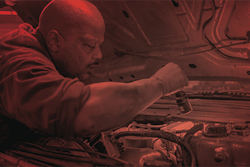California is leading the nation's charge into electric trucking, but a recent report compiled the American Transportation Research Institute (ATRI) found that the Golden State may not be ready for it.
ATRI analysis of California’s readiness for full vehicle electrification, an expansion of ATRI’s December 2022 report, Charging Infrastructure Challenges for the U.S. Electric Vehicle Fleet, found that California’s top-3 power generators face an uncertain future, further widening the gap between power generation and demand for electricity. Diablo Canyon, California’s last nuclear power plant, provides 8.5% of in-state electricity. In 2018 the CPUC approved a plan to close the plant in 2025, but the state has since moved to keep it open longer, ATRI noted.
"More than 136 billion gallons of gasoline and nearly 44 billion gallons of diesel were consumed by roadway users in 2019," the authors wrote in their 2022 report. "Replacing this energy with electricity will require significant increases in the amount of electricity produced and consumed in the U.S... The electricity that would be consumed by the U.S. trucking fleet is also significant – at 553.5 billion annual kWh it represents 14% of all electricity consumed in the U.S. in 2019 (3,954 billion kWh). Within the trucking category, long-haul combination trucks would make up the largest roadway consumer of electricity, using 417.4 billion kWh or 10.6% of all U.S. consumption in 2019."
With full electrification of today’s light-, medium- and heavy-duty vehicles in the U.S., an additional 1,593.8 billion kWh of electricity would be needed – an increase in annual U.S. electricity consumption of 40.3%, ATRI found.
Californians already pay the second highest average rate for electricity at 22.33¢ per kWh, compared to the national average of 12.36¢ per kWh. With new battery-electric vehicle trucks stickering for more than $425,000 – more than double the cost of a comparable diesel truck – California’s supply chain will get more expensive. Additionally, the cost to power a battery-electric heavy truck, including equipment, installation, utility upgrades and electricity, could be as high as $1.21 per mile, ATRI found.
Californians will see an increase in the number of trucks on the road as the heavier battery weight will reduce cargo-carrying capacity in each truck. ATRI estimates for every 1,000 trucks currently on the road, an additional 343 trucks will be needed due to battery weight.
The nation currently faces a significant truck parking shortage, with an estimated one parking space for every 11 truck drivers. Adding a charger at each of California’s 13,144 truck parking spaces would cost between $1.472 billion and $2.878 billion for just the purchase and installation of the charging units.










